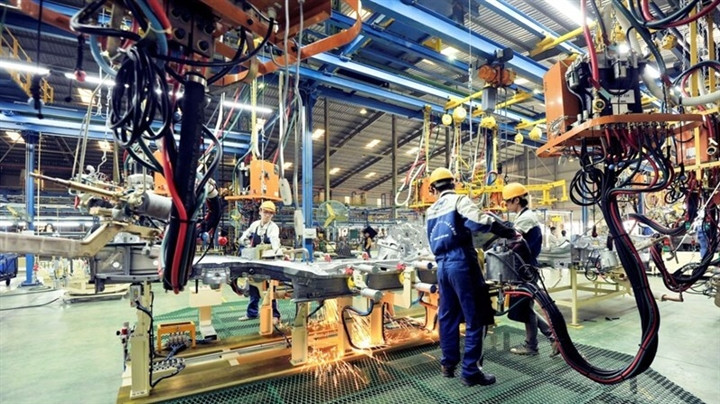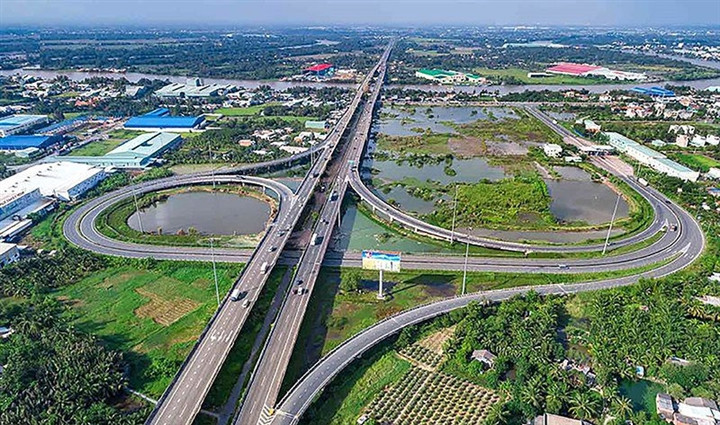Analysts believe that, in addition to the negative impacts, it is necessary to acknowledge the opportunities that the COVID-19 pandemic brings to Vietnam's economy.
The Vietnam Institute for Economic and Policy Research (VEPR) under the University of Economics - Vietnam National University, Hanoi has just released the Vietnam Economic Annual Report 2021 with the theme "Repositioning Vietnam in the context of global fluctuations".
Notably, besides the terrible impacts, the report also pointed out many positive impacts that the COVID-19 pandemic has brought to the Vietnamese economy.
Many opportunities to shine
Overviewing the world economy in 2020, Associate Professor, Dr. Nguyen Anh Thu - Vice President of the University of Economics, Director of the Institute for Economic and Policy Research - commented that the context of global fluctuations in recent years and especially the outbreak of the COVID-19 pandemic has caused global economic growth to decline and become unpredictable.
However, with the Vietnamese economy, new opportunities can still be seen. First is the opportunity to increase Vietnam's footprint in trade, investment flows and position in the chain global value.
Assoc. Prof. Dr. Nguyen Anh Thu analyzed that the COVID-19 pandemic caused disruptions in value chains, leading to restructuring of value chains, dispersion of investment activities out of China or implementation of the "China +1" strategy, and Vietnam has the opportunity to shine as a new production base.

In addition to negative impacts, the COVID-19 pandemic also brings many opportunities for Vietnam's economy
In addition, strategic competition and policy adjustments of major countries help Vietnam take advantage of cooperation frameworks, strategic partnerships, and comprehensive partnerships. This opportunity helps Vietnam fill the market gap left by China when it moves up to the high-end goods and services segment as well as increase exports to the US in the context of the US-China trade war.
The implementation of signed FTAs, especially EVFTA, CPTPP, UKVFTA and RCEP, helps Vietnam increase the quantity and quality of trade and investment, diversify partners and participate in value chains led by the West and China.
In addition, the COVID 19 pandemic has contributed to accelerating the digital transformation process in Vietnam. Digitalizing the economy helps change thinking in policy making and business operations to enhance the comparative advantages of industries and businesses; promote the application, dissemination of technology and innovation. This creates new business opportunities and models; increases the participation of small and medium enterprises (SMEs) in global value chains; develops service industries and cross-border trade in services; and attracts FDI to create higher added value.
The challenges from climate change and commitments in new-generation FTAs are also the driving force for green growth and sustainable development in Vietnam. For some sectors, the need to mitigate and adapt to climate change can create new business opportunities and opportunities to participate in global value chains with higher standards, including the agricultural and food sectors where Vietnam has great potential.
Meanwhile, pressure from global environmental policies and from Vietnam's major trading partners (the US and EU) creates motivation for the Government to improve regulations and policies; businesses to change their production and business models. This helps to upgrade the production and business standards of the entire economy to better suit international trade practices and increase their presence in the global market.
However, in addition to opportunities, Vietnam's economy also faces many challenges such as: disrupting the global supply chain and affecting Vietnam's production and export activities.
Climate change causes unusual weather phenomena, causing disruptions in production and international trade activities.
The process of digitalization and greening the economy creates challenges in the process of adjusting strategies and development models from both governance, infrastructure and human resources aspects. Labor-intensive industries account for a relatively large proportion, which is also a challenge in promoting digital transformation in Vietnam.
In addition, the implementation of FTAs increases imports and the presence of foreign enterprises creates fierce competitive pressure on Vietnamese enterprises. Access to markets of major economies is also becoming more difficult due to many barriers as countries strengthen protection of domestic markets, increasingly high standards for goods and services, and requirements for green, clean, and safe products.
What should Vietnam do to seize the opportunity?
Providing many important policy recommendations for the strategy of repositioning the Vietnamese economy in the context of global fluctuations, Associate Professor, Dr. Nguyen Anh Thu commented: "In the short term, Vietnam needs to make efforts to synchronously implement measures to control COVID-19, organize vaccination quickly and effectively".
Due to limited fiscal resources, policies to support businesses and people in Vietnam during the pandemic need to be focused, economical, and targeted. Quickly design a general stimulus and production/business recovery policy package for all types of businesses and business households, credit support/guarantee policies, especially for small and medium-sized/micro-sized enterprises.
In addition, public investment should only focus and accelerate on planned national key projects. Saving on regular expenditures is also an important orientation when COVID-19 is still an unknown and the future of the economy is still uncertain.

Experts believe that public investment should only focus and accelerate on national key projects.
Assoc. Prof. Dr. Nguyen Anh Thu affirmed: "Monetary policy needs to pay special attention to controlling money supply growth and directing credit flows to the production sector. In the context of hot stock and real estate markets like today, controlling credit flows to these markets also needs special attention in addition to the issue of bad debt".
In the medium and long term, in parallel with the short-term policies being implemented to minimize the negative impacts of COVID-19, Vietnam should persevere with longer-term reforms to improve the macro foundation and minimize future risks.
Vietnam continues to promote economic growth mainly in depth, perfecting the synchronous growth model to promote development on the basis of innovation, improving labor productivity, applying scientific and technological advances, improving the quality of human resources, promoting comparative advantages and proactively integrating internationally.
In all situations, inflation, interest rates and exchange rates need to be maintained stably to prepare for the post-pandemic recovery period. At the same time, Vietnam needs to take advantage of trade and investment to improve its position in the international arena in the future.
Improving competitiveness and the business environment remains a constant requirement. In particular, it is necessary to continue improving the local business environment for enterprises through the pillars of the Provincial Competitiveness Index (PCI).
Associate Professor, Dr. Nguyen Anh Thu said: "Although public investment needs to be selective, the Government needs to quickly improve the transportation system to promote the circulation of international trade and investment activities; take advantage of FTAs to reduce and simplify customs procedures and administrative procedures to facilitate trade activities.
Vietnamese enterprises also need to improve their understanding and ensure their ability to meet international standards on product quality, origin... to affirm their position on the world stage. In addition, Vietnam needs to improve the level and quality of human resources to benefit from and make the most of technology transfer and science and technology from foreign enterprises".
According to VTC News